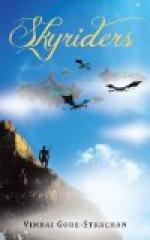He rolled to an elbow and looked back along the fuselage to the tail, his eyes dwelling fondly on the clean lines of her, the perfect symmetry, the glossy, unharmed covering. His glance went farther, to where the brother of Tomaso plodded toward the basin’s rim, peering here and there, pausing to look under a bush, swerving to make sure the lost fuselage was not behind a rock.
Johnny’s grin widened. Presently it exploded into a laugh, which he smothered with both hands clapped over his mouth. He writhed and kicked and rolled in the sand. His round, blue eyes grew moist with the tears of a boy’s exuberant mirth. From behind his palms came muffled who-who-who-oo-oos of laughter.
He believed that he was laughing at the trick he had played on Tomaso’s brother. He was doing more than that: he was making up for all the sober longing, for all the fears and the discouragements of his barren life. There had been so much hoping and sighing and futile wishing—it had been so long since Johnny Jewel had really laughed—and he was young, and youth is the time of carefree laughter. Now nature was striking a balance for him.
Tomaso’s brother went up over the rim of the basin, disappeared, and then came plodding back through the heat. Johnny had laughed all that while; laughed until his sides were sore; until his eyes were red with the tears he had shed; until he was so weak he staggered when he first crawled out from under the plane and stood up. But it did him good, for all that, to have laughed so hard and so long over an impish trick that came from the boy in him.
“Me, I don’t find him that damn fuz’lawge,” said the brother of Tomaso, wiping his swarthy countenance that was beaded with sweat. “That Tomaso, he has took, I bet. He brings it to you queeck when I’m through with him.” He looked at Johnny expectantly. “I’m promise you it comes back all right, if perhaps Tomaso has take. Perhaps now you pay twenty-fi’ dollar?”
“No, I don’t; I pay you ten dollars now.” Johnny, remember, had a full two days’ acquaintance with the brother of Tomaso. He was taking a certain precaution, rather than an unfair advantage. He honestly believed that the brother of Tomaso was best dealt with cautiously.
“When this airplane is safe at Sinkhole, and you’ve brought me every darned thing that’s been packed off, I’ll pay you the rest of the fifty. There’s more,” he added meaningly, “that’s missing. The fuselage ain’t all.”
The brother of Tomaso seemed unhappy. He took the ten dollars with a sigh, promised himself much unpleasantness for Tomaso, and wearily set about making camp, too dispirited to care that Johnny spent the time in fussing around the machine, making a thin pretense of looking it over for breakages and defects when all the while he was simply adoring it.
“At daybreak,” Johnny announced with a new dignity in his voice—the dignity of one having valuable possessions and a potential power—“we’ll start back. But I don’t think much of your idea that we can drag this machine home with our saddle horses. We can’t—not and have anything but a bundle of junk when we get there. There’s a ranch over south here, a mile or so. Better see if you can’t get a wagon and team. We’ll have to haul it home somehow.”




